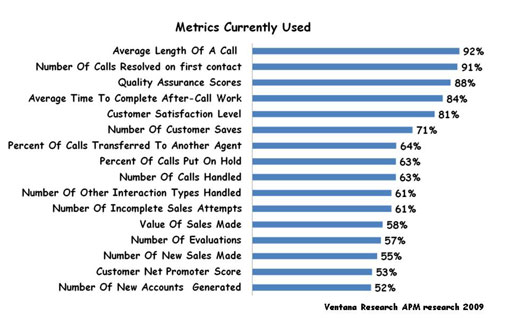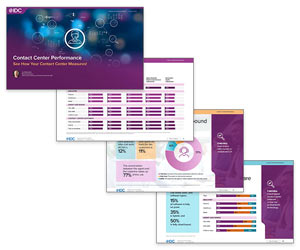We all measure the number of calls answered in 15 seconds, and the amount of wrap-up time. Why? Because they are easy to measure.
Richard Snow’s research indicates that they may have gone past their sell-by date.
Last year, I carried out a benchmark study into agent performance management. One of the key questions was about what metrics companies currently use to measure how well they are performing at handling customer interactions.

I deliberately included options that might be seen as traditional service-level measures and others that are much more business and outcome related.
As the chart shows, the results were quite interesting and not really that unexpected, given my overall experience talking to contact centre managers.
The biggest surprise was that the two metrics about pure volumes of calls and other types of interactions handled only made it as far as 9th and 10th in the list. This suggests companies are more interested in timing statistics, with average length of a call not surprisingly being the number one metric and the time taken to complete after-call work making number 4.
First-call resolution
In terms of business and outcome measures, first-call resolution rates have climbed up the list and made it to number 2, and, given all the hype around it, not surprisingly customer satisfaction scores make it into the top five.
But what of real business measures?
You have to look quite a long way down the list to number 6 before you see anything business related (number of customer saves) and value of sales only makes it in at number 12, and number of new accounts generated comes bottom of the list.
This all rather suggests that traditional service-level metrics have far from reached their sell-by date and companies are more interested in how efficient their centres are rather than how effectively they are performing at delivering against key business objectives.
The average company uses six measurements
What these top-line results don’t show is that on average companies use six metrics to judge the performance of their centres, and indeed the six includes a mixture of service-level metrics, outcome measures and business-related measures.
It is this that really points us to the answer as to whether service stats have outlived their sell-by date, which is of course “yes” and “no”. Yes because by themselves they don’t paint the complete picture and used incorrectly they could actually do more harm than good, and no because they will always be part of any set of metrics used to judge the performance of contact centres (or more broadly, the handling of customer interactions). What I think we will see is that the mix of metrics will change, so while traditional service metrics will remain, the balance will swing more to business- and outcome-related metrics.
In fact, I have already seen more importance being placed on a crucial metric – first-call (or interaction) resolution rates (FCR).
FCR in truth is a hybrid metric in that it includes an element of efficiency (more interactions were closed at the first attempt so more efficient and fewer follow-ups, also saving money) and an element of outcome (more closed at the first attempt, so happy customers). The challenge for companies is to measure true FCR rates, for example, closing a call by saying “someone will get back to you” should not be included as closed at the first attempt.
These days companies have to look across multiple channels to track interactions and define, then monitor, which are truly closed to the customer’s satisfaction. However, what is interesting is that centre managers I have spoken with say changing to focus on FCR brings about a change of behaviour in people handling interactions, in that they try harder to solve the customer’s issue, which can only be good for the customer, the company and the agent.
And this is why companies need to move on from just relying on traditional service-level metrics and begin to include business- and outcome-related measures in a composite set of metrics that drive better behaviours, that deliver better business results, and as a consequence indeed drive some of the efficiencies they are so eager to see.

Richard Snow
Richard J Snow is VP and Research Director at Ventana Research (www.ventanaresearch.com)
Author: Jo Robinson
Published On: 27th Jan 2010 - Last modified: 14th Mar 2019
Read more about - Technology, First Contact Resolution (FCR), Metrics, Service Level, Statistics

















Whilst I feel it is true that we as an industry should move to more customer focused metrics, the difficulties that I see are to move away from existing easy to measure metrics.
The other question is at what level these metrics are used or targeted. I try not to target such things as average calls per hour and call durations at the agent level. As I feel that these can be depremental to the customer experience without balance to quality and satisfaction scoring measures.
I agree that quantity over quality is an issue. operating a helpline (not sales) it can be difficult to find the right balance. Quick question, we are currently taking the abandon call rates into account when calculating our service level (without thresholds)what is your opinion on this, do you do the same and do you use thresholds??
would love to hear from you.
Cheers